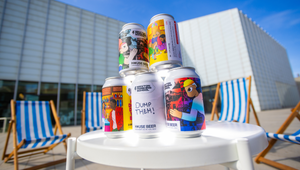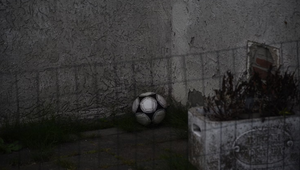
5 Minutes with… Billy Faithfull

Advertising creatives can come from anywhere, but a background in archaeology doesn’t sound like something that would set you up to work on creative ideas that will solve corporate clients’ problems. Yet Billy Faithfull has managed to leverage his archaeology degree into a successful creative career, culminating in his current role as chief creative officer at The Engine Group, UK.
Since starting out, making outlandish work for Tango and Pot Noodle at radical London shop HHCL, Billy’s gone on to work for some of the most broadly recognised British brands, from The Sun and News of The World to Warburtons and E.ON. A lot of this has been totally outlandish too, either in its huge ambition or just plain weirdness.
LBB’s Alex Reeves caught up with Billy to find out more.
LBB> What were you like as a kid? And is that reflected in how you operate as a CCO today?
BIlly> I spent my early childhood years squatting down with my head in the earth, looking under rocks, discovering stuff. Four years of my childhood were in Kenya, where my Dad worked, which was a dreamlike existence consisting of safari, beach and the insane noise of central Nairobi in the 1980s. At school I was a social diplomat. I saw the good in everyone. I spent much of my time defending the jocks to the art-heads, and vice versa. I’ve always got on with 99.9% of the people I’ve met and I have a natural inclination for understanding and peace amongst warring factions. I guess this has crept into my work as a leader, which is as much of a weakness as it is a superpower. Hopefully more of the latter, but it does get me into trouble sometimes. I tend to see the good in work too, I’m always certain there’s something in every idea, it just has to be teased out, shaped and evolved.
LBB> You studied archaeology... What was that like!? And does it hold any bearing on what you do now?
Billy> I realised in my second week I would not be an archaeologist. Tents, for the first part, are not a place to live your life, nor faculties of universities. Not for me anyway. I loved it though. I was useless at the data side, the science, but there’s a point at which the archaeological record stops and you have to fill in the blanks. That I was good at. It was about looking at a small amount of information, what was left in the ground, and telling a story about what happened. I loved it and it’s pretty similar to what I do today. You have the raw materials, the RTBs, the brief, the proposition. Now you have to tell a human story about it.
LBB> You started out at HHCL. An agency which was totally dominant at the time, but increasingly young creatives are unaware of. What was your first job there like?
Billy> It was heaven. Ross Neil and I had quit trying to get hired (post-9/11 not a great time for jobseekers and our book was ‘un-hire-ably good’ apparently). Steve Henry and Jon Burley hired us off book, no placement. One minute I was mourning a wasted 18 months of my life trying to make a pipe dream come true, the next I was in a padded cell working on a Tango brief. HHCL was completely radical at the time, and we caught the tail end of it as Mother, Fallon, W+K were getting off the ground, staffed by many ex-HHCLers. They considered themselves ‘Professionally Radical’ and it showed in the work. I remember Jon Thake and Lee Tan presenting The Pot Noodle Horn in a meeting and no one batted an eyelid. The idea was literally ‘I’ve got an erection for a Pot Noodle’. They put boners on TV. Insane. No one cared about awards. It was just 100% about radical originality, often that meant the opposite of craft and ad trends. I think every great agency in London owes its existence to Steve Henry in one way or another. Best Ad-Dad ever.
LBB> How is the industry better today than it was back in those “good old days”?
Billy> I’m not sure I ever worked back in the proverbial good old days. Making ads was hard then, it’s hard now. Clients were demanding then, they’re demanding now. The one thing I would say is that with the media landscape now, there is more opportunity for storytellers and creators as the world’s thirst for content, interaction and connectivity has increased exponentially. Those people yearning for the good old days probably think of craft and storytelling solely as reflections of the dominant media of their formative years, namely cinema and TV, or books and mags, if you’re going way back. The sooner people adjust their frame of reference the better they can serve the channels they’re working in. What good is an anamorphic lens when you’re watching a 1x1 film on your phone. Not much. So if the media landscape is changing, so too is the type of people who are doing the work, whether they’re from the good old days embracing the current, or whether they cut their creative teeth on YouTube and TikTok.
LBB> What was the most formative client / campaign project you worked on in your early career and how did it change the way you work?
Billy> When we pitched for Warburtons, I asked the customer care team to send us some real letters from the public. One was from a man who had only just tried his first crumpet at 48, and he was genuinely disappointed to have wasted so much of his life. One was from a man who suffered from erectile dysfunction he (wrongly) believed was related to an ingredient in fruit loaf. Another was a heartbreaking note, written on a spiral notepad, from an 83 year old who ate a crumpet each day at 3pm to remind her of her late husband. It was the first thing we showed in the pitch and we built the campaign around letters to Jonathan Warburton which eventually became A-listers coming to Bolton. The answer is invariably staring you in the face, or if not, just below the surface. The best you can do is get your spade out and start digging. Robin Wight called it ‘Advertising Archaeology’. See what I did there?
LBB> I’m always intrigued by creatives becoming creative directors because it seems like a drastic change in job description. When that happened to you, what was it like and what was the most important thing you learned?
Billy> It was a baptism of fire on The Sun and News of The World newspapers. It was fast and furious. “We put a paper out every day, why can’t you muppets get an ad out in a week?“. Pretty hard to disagree, so we became very quick and off the cuff. We nabbed creatives by the hour and sat in rooms getting to ideas quickly and we pissed off the agency who were trying to tie us to a standard process, but there wasn’t time to follow the rules. The biggest thing I learned quickly was that agencies, creatives, strategists and directors don’t make the work. The client does. Find clients who really get you and stick to them like glue. And if everyone is making a different ad in their heads, you’re fucked. So you have to take everyone on the journey and constantly check you’re all in the same place.
LBB> Your work on the ‘Nature’s Closing Down Sale’ did so well to communicate an environmental message in a way that’s not overtly depressing. What did you find most interesting about working on that?
Billy> It’s my favourite Born Free work to date. What people might not realise was the context. It’s a Black Friday sale ad. We needed to shift as many adoption packs with cuddly toys for Christmas as possible. The tone of the work I would say is right in my sweet spot. A smart idea masquerading as a stupid one. A powerful story told in a silly way. The tension in that work is uncomfortably funny and you know where it’s going from the off so you just enjoy it, knowing that at some point you have to face up to what is a dark and emotional story. We talk a lot about our work being its best at the meeting point of truth and friction. Truth: what’s the enduring, authentic story? Friction: what’s the most rebellious way you can tell it? I can’t think of work that better expresses our core creative philosophy. And there’s an airhorn in it. So you know it’s good.
LBB> I was enchanted by the beautiful work you recently did with Sky Zero. That must have taken a lot of careful consideration and craft to get it done. What were the big challenges and decisions?
Billy> Christ, how long have you got? Naturally, Covid cut our budgets, put everything on hold, forced us to work 100% remotely between LA, London and Bordeaux, we had to be carbon net zero naturally which had its challenges, but mostly the hardest thing was attempting to stand out from all the gloom and doom, to show that Sky is committed to inspiring people to do their bit and that there is hope in the ether as much as there is hopelessness. Here’s hoping it goes a small way to getting us on the right path.
LBB> What other work are you particularly proud of recently and why?
Billy> The Kiyan Prince Foundation work. It was such a moonshot to get a global property like FIFA21 and EA to bring Kiyan back to life in the game as a playable character and it speaks to what we’re trying to do at Engine, bring together very different people to come up with new ways of telling stories and getting attention. When I present that work I always start with the structure of an old-fashioned joke. A creative team, an integrated producer, an entertainment content director, an influencer strategist and a PR lead walk into a bar... That sums it up for me. Different people from different worlds trying their damnedest to do something impossible. There were many times in the 18 months it took to make that work that everyone lost all hope, but everyone kept each other going, inspired by Kiyan’s dad who was a force of nature. All you needed was 15 mins on the phone with him and you were back on your feet.
LBB> Other than eating taramasalata, what do you turn to for inspiration when you’re in a rut?
Billy> Techno and sci-fi. Specifically Surgeon and Ian M. Banks’ Culture series. On rotation. Comedians on TikTok. My wife and her unstoppable, spontaneous creativity. And hummus.















